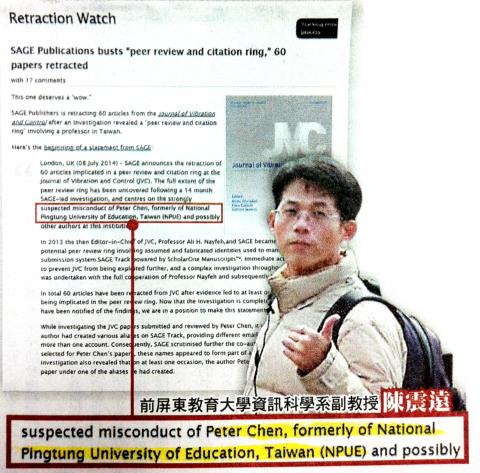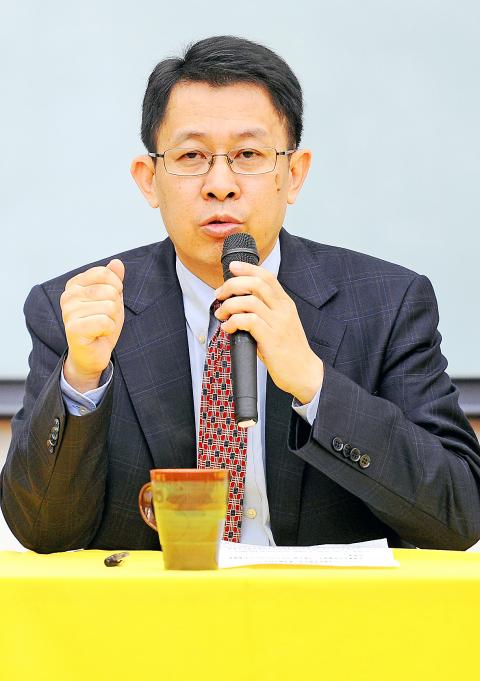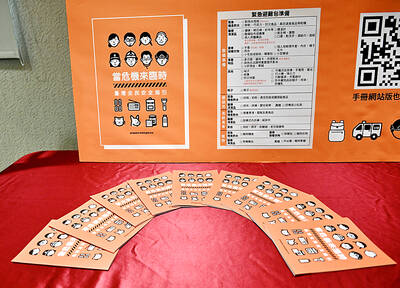A professor has been accused of academic fraud after 60 articles were withdrawn from a scientific journal.
The accusations are centered on Chen Chen-yuan (陳震遠), also known as Peter Chen, who has since resigned from his position as associate professor of computer science at the National Pingtung University of Education in southern Taiwan.
The Journal of Vibration and Control, a leading publication in the field of acoustics, retracted 60 papers linked to Chen, accusing him of “perverting the peer-review process” by creating fraudulent online accounts representing 130 academics to give favorable judgements on papers to help get them published, the Guardian reported on Thursday.

Photo: Liberty Times
The New York Times reported that Chen had set up a “peer-review and citation ring” consisting of fake scientists, as well as real ones whose identities he had assumed.
Sage Publications, which produces the magazine, said the retracted papers all had at least one author or reviewer implicated in the ring and that other scientists were involved in the activity.
The Washington Post reported that the ring was rigging the review process to get articles published and the mass retraction was “mind-blowing.”

Photo: Chu Pei-hsiung, Taipei Times
“A fraud accusation like nothing you’ve seen before,” wrote Pulitzer Award-winning reporter and business author Michael Hiltzik in the Los Angeles Times, adding “this one takes the cake” for academic fraud.
Taiwanese Nobel laureate and former head of Academia Sinica Lee Yuan-tseh (李遠哲) said yesterday that “this is disgraceful, a very terrible thing.”
“Taiwan’s academic community must take stock of this, the old way of ‘quantity over quality’ must change. In competing for funding and promotion, many Taiwanese professors aim for a high number of published papers,” he said.
Among the retracted papers, five have Minister of Education Chiang Wei-ling (蔣偉寧) listed as a coauthor.
Chiang convened a press briefing yesterday and denied involvement.
“The five papers are not fraudulent, they are solid works of research done by my doctorate and master’s students. I will ask them to find out why the retractions were made. We shall defend our rights as necessary,” Chiang said.
Chiang said that some problems might have occurred during the review and publication process.
“I was only responsible for supervising the papers,” he said, adding that the individuals responsible for the alleged fraud should clarify the situation.
Chiang said he was only involved because one of his doctorate students was Chen’s brother.
He said that the brothers had assisted each other to organize the papers to be published and were responsible for listing the coauthors, “but because I was busy with official functions, I had no knowledge of these things until recently.”
Associate professor of law at National Chengchi University Liu Hung-en (劉宏恩) said: “The widespread scale of the scandal and the audacity of the perpetrated fraud are unheard of.”
He said Chiang was being irresponsible.
“So he was the supervisor for student’s research and listed as a coauthor, but when things go wrong, he pins everything on the student,” Liu said. “The matter needs to be investigated.”

One of two tropical depressions that formed off Taiwan yesterday morning could turn into a moderate typhoon by the weekend, the Central Weather Administration (CWA) said yesterday. Tropical Depression No. 21 formed at 8am about 1,850km off the southeast coast, CWA forecaster Lee Meng-hsuan (李孟軒) said. The weather system is expected to move northwest as it builds momentum, possibly intensifying this weekend into a typhoon, which would be called Mitag, Lee said. The radius of the storm is expected to reach almost 200km, she said. It is forecast to approach the southeast of Taiwan on Monday next week and pass through the Bashi Channel

NO CHANGE: The TRA makes clear that the US does not consider the status of Taiwan to have been determined by WWII-era documents, a former AIT deputy director said The American Institute in Taiwan’s (AIT) comments that World War-II era documents do not determine Taiwan’s political status accurately conveyed the US’ stance, the US Department of State said. An AIT spokesperson on Saturday said that a Chinese official mischaracterized World War II-era documents as stating that Taiwan was ceded to the China. The remarks from the US’ de facto embassy in Taiwan drew criticism from the Ma Ying-jeou Foundation, whose director said the comments put Taiwan in danger. The Chinese-language United Daily News yesterday reported that a US State Department spokesperson confirmed the AIT’s position. They added that the US would continue to

The number of Chinese spouses applying for dependent residency as well as long-term residency in Taiwan has decreased, the Mainland Affairs Council said yesterday, adding that the reduction of Chinese spouses staying or living in Taiwan is only one facet reflecting the general decrease in the number of people willing to get married in Taiwan. The number of Chinese spouses applying for dependent residency last year was 7,123, down by 2,931, or 29.15 percent, from the previous year. The same census showed that the number of Chinese spouses applying for long-term residency and receiving approval last year stood at 2,973, down 1,520,

EASING ANXIETY: The new guide includes a section encouraging people to discuss the threat of war with their children and teach them how to recognize disinformation The Ministry of National Defense’s All-Out Defense Mobilization Agency yesterday released its updated civil defense handbook, which defines the types of potential military aggression by an “enemy state” and self-protection tips in such scenarios. The agency has released three editions of the handbook since 2022, covering information from the preparation of go-bags to survival tips during natural disasters and war. Compared with the previous edition, released in 2023, the latest version has a clearer focus on wartime scenarios. It includes a section outlining six types of potential military threats Taiwan could face, including destruction of critical infrastructure and most undersea cables, resulting in